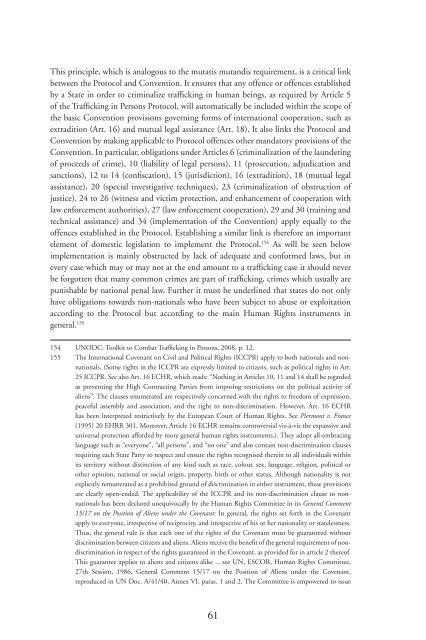Trafficking in human beings: human rights and ... - unesdoc - Unesco
Trafficking in human beings: human rights and ... - unesdoc - Unesco
Trafficking in human beings: human rights and ... - unesdoc - Unesco
Create successful ePaper yourself
Turn your PDF publications into a flip-book with our unique Google optimized e-Paper software.
This pr<strong>in</strong>ciple, which is analogous to the mutatis mut<strong>and</strong>is requirement, is a critical l<strong>in</strong>k<br />
between the Protocol <strong>and</strong> Convention. It ensures that any offence or offences established<br />
by a State <strong>in</strong> order to crim<strong>in</strong>alize traffi ck<strong>in</strong>g <strong>in</strong> <strong>human</strong> be<strong>in</strong>gs, as required by Article 5<br />
of the Traffi ck<strong>in</strong>g <strong>in</strong> Persons Protocol, will automatically be <strong>in</strong>cluded with<strong>in</strong> the scope of<br />
the basic Convention provisions govern<strong>in</strong>g forms of <strong>in</strong>ternational cooperation, such as<br />
extradition (Art. 16) <strong>and</strong> mutual legal assistance (Art. 18). It also l<strong>in</strong>ks the Protocol <strong>and</strong><br />
Convention by mak<strong>in</strong>g applicable to Protocol offences other m<strong>and</strong>atory provisions of the<br />
Convention. In particular, obligations under Articles 6 (crim<strong>in</strong>alization of the launder<strong>in</strong>g<br />
of proceeds of crime), 10 (liability of legal persons), 11 (prosecution, adjudication <strong>and</strong><br />
sanctions), 12 to 14 (confi scation), 15 (jurisdiction), 16 (extradition), 18 (mutual legal<br />
assistance), 20 (special <strong>in</strong>vestigative techniques), 23 (crim<strong>in</strong>alization of obstruction of<br />
justice), 24 to 26 (witness <strong>and</strong> victim protection, <strong>and</strong> enhancement of cooperation with<br />
law enforcement authorities), 27 (law enforcement cooperation), 29 <strong>and</strong> 30 (tra<strong>in</strong><strong>in</strong>g <strong>and</strong><br />
technical assistance) <strong>and</strong> 34 (implementation of the Convention) apply equally to the<br />
offences established <strong>in</strong> the Protocol. Establish<strong>in</strong>g a similar l<strong>in</strong>k is therefore an important<br />
element of domestic legislation to implement the Protocol. 154 As will be seen below<br />
implementation is ma<strong>in</strong>ly obstructed by lack of adequate <strong>and</strong> conformed laws, but <strong>in</strong><br />
every case which may or may not at the end amount to a traffi ck<strong>in</strong>g case it should never<br />
be forgotten that many common crimes are part of traffi ck<strong>in</strong>g, crimes which usually are<br />
punishable by national penal law. Further it must be underl<strong>in</strong>ed that states do not only<br />
have obligations towards non-nationals who have been subject to abuse or exploitation<br />
accord<strong>in</strong>g to the Protocol but accord<strong>in</strong>g to the ma<strong>in</strong> Human Rights <strong>in</strong>struments <strong>in</strong><br />
general. 155<br />
154 UNODC: Toolkit to Combat Traffi ck<strong>in</strong>g <strong>in</strong> Persons, 2008, p. 12.<br />
155 The International Covenant on Civil <strong>and</strong> Political Rights (ICCPR) apply to both nationals <strong>and</strong> nonnationals.<br />
(Some <strong>rights</strong> <strong>in</strong> the ICCPR are expressly limited to citizens, such as political <strong>rights</strong> <strong>in</strong> Art.<br />
25 ICCPR. See also Art. 16 ECHR, which reads: “Noth<strong>in</strong>g <strong>in</strong> Articles 10, 11 <strong>and</strong> 14 shall be regarded<br />
as prevent<strong>in</strong>g the High Contract<strong>in</strong>g Parties from impos<strong>in</strong>g restrictions on the political activity of<br />
aliens”. The clauses enumerated are respectively concerned with the <strong>rights</strong> to freedom of expression,<br />
peaceful assembly <strong>and</strong> association, <strong>and</strong> the right to non-discrim<strong>in</strong>ation. However, Art. 16 ECHR<br />
has been <strong>in</strong>terpreted restrictively by the European Court of Human Rights. See Piermont v. France<br />
(1995) 20 EHRR 301. Moreover, Article 16 ECHR rema<strong>in</strong>s controversial vis-à-vis the expansive <strong>and</strong><br />
universal protection afforded by more general <strong>human</strong> <strong>rights</strong> <strong>in</strong>struments.). They adopt all-embrac<strong>in</strong>g<br />
language such as “everyone”, “all persons”, <strong>and</strong> “no one” <strong>and</strong> also conta<strong>in</strong> non-discrim<strong>in</strong>ation clauses<br />
requir<strong>in</strong>g each State Party to respect <strong>and</strong> ensure the <strong>rights</strong> recognised there<strong>in</strong> to all <strong>in</strong>dividuals with<strong>in</strong><br />
its territory without dist<strong>in</strong>ction of any k<strong>in</strong>d such as race, colour, sex, language, religion, political or<br />
other op<strong>in</strong>ion, national or social orig<strong>in</strong>, property, birth or other status. Although nationality is not<br />
explicitly remunerated as a prohibited ground of discrim<strong>in</strong>ation <strong>in</strong> either <strong>in</strong>strument, these provisions<br />
are clearly open-ended. The applicability of the ICCPR <strong>and</strong> its non-discrim<strong>in</strong>ation clause to nonnationals<br />
has been declared unequivocally by the Human Rights Committee <strong>in</strong> its General Comment<br />
15/17 on the Position of Aliens under the Covenant: In general, the <strong>rights</strong> set forth <strong>in</strong> the Covenant<br />
apply to everyone, irrespective of reciprocity, <strong>and</strong> irrespective of his or her nationality or statelessness.<br />
Thus, the general rule is that each one of the <strong>rights</strong> of the Covenant must be guaranteed without<br />
discrim<strong>in</strong>ation between citizens <strong>and</strong> aliens. Aliens receive the benefi t of the general requirement of nondiscrim<strong>in</strong>ation<br />
<strong>in</strong> respect of the <strong>rights</strong> guaranteed <strong>in</strong> the Covenant, as provided for <strong>in</strong> article 2 thereof.<br />
This guarantee applies to aliens <strong>and</strong> citizens alike ... see UN, ESCOR, Human Rights Committee,<br />
27th Session, 1986, General Comment 15/17 on the Position of Aliens under the Covenant,<br />
reproduced <strong>in</strong> UN Doc. A/41/40, Annex VI, paras. 1 <strong>and</strong> 2. The Committee is empowered to issue<br />
61

















